Learn about the agencies that keep us safe, and good tips to follow during your visit
The safety of our visitors is our top priority. Destination DC works closely with the Mayor of the District of Columbia, the Metropolitan Police Department and other local and federal government agencies to understand and communicate safety messages on behalf of the tourism community.
Sept. 12, 2025 Update
- On Monday, Aug. 11, President Trump announced an emergency order that allowed a temporary federal takeover of the Metropolitan Police Department (MPD).
- It lasted 30 days and ended on Sept. 11, 2025.
- The National Guard is expected to maintain a presence in Washington, DC through December.
DC safely welcomes millions of visitors each year to the nation’s capital. Here is some helpful information as well as links and important phone numbers.
DC’s Homeland Security and Emergency Management Agency (HSEMA) leads the planning and coordination of homeland security and emergency management efforts to ensure that the District of Columbia is prepared. HSEMA is a resource for:
- Information about emergency evacuations. There are 19 evacuation routes out of the city. Look for marked signs or find a route based on your location.
- AlertDC, the District’s emergency notification system. Visitors and residents can sign up to receive alerts via e-mail or text message. Tune in to Cable Channels 13, 16, or local news to also receive updates.
Washington Metropolitan Area Transit Authority (WMATA) and Metro Transit Police Department (MTPD) oversee safety of DC’s public transit system. MTPD police officers have jurisdiction throughout DC, Maryland and Virginia and officers provide a variety of law enforcement and public safety services on the Metrorail and Metrobus systems in the region. Visitors are encouraged to report suspicious activity by calling 202-962-2121 or texting MyMTPD (696873).
Mayor Muriel E. Bowser is committed to addressing safety concerns. Some of her initiatives include:
- Devoting $214 million to gun violence prevention
- Investing $3 million in community grants focused on violence prevention
- Installation of more than 1,200 security cameras
- Deploying more than 1,200 body-worn cameras to officers
- Training and recruitment of law enforcement agents
Follow these general safety guidelines from the Metropolitan Police Department:
- Be alert and aware of your surroundings. Remove headphones and put cell phones away.
- Don’t travel alone late at night.
- If you see something, say something. You can text information to MPD at 50411 or call 9-1-1 in an emergency.
- Do not accept packages from strangers.
- Do not leave luggage unattended.
- Plan evacuation routes in case of an emergency.
Traveling safely to Washington, DC:
- Amtrak, along with the Amtrak Police Department, has a range of behind-the-scenes and front-line security measures in place to ensure passenger rail security.
- The Metropolitan Washington Airports Authority’s Public Safety Office oversees safety operations for Ronald Reagan National Airport and Dulles International Airport.
- BWI Airport’s security information
- Learn more about TSA Precheck
Medical care:
- There are numerous hospitals in Washington, DC should you need to seek immediate medical attention. This includes George Washington University Hospital, multiple MedStar hospital locations, Howard University Hospital, Children's National Medical Center and Sibley Memorial Hospital.
- For in-home medical treatment, Doctors To You provides house calls to individuals seeking medical care wherever you are in the Washington, DC, Maryland and Virginia area.
Additional Washington, DC resources:
- Emergency Preparation Videos
- Police
- Fire Services, (202) 462-1762
- Department of Health
- 311 – non-emergency DC services
- U.S. Capitol Police: (202) 224-5151
- U.S. Park Police (202) 619-7910
Local news:




